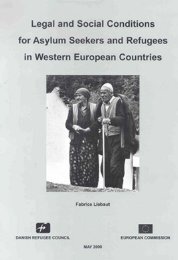Bulgaria - The social impact of seasonal migration
Bulgaria - The social impact of seasonal migration
Bulgaria - The social impact of seasonal migration
Create successful ePaper yourself
Turn your PDF publications into a flip-book with our unique Google optimized e-Paper software.
50<br />
because <strong>seasonal</strong> migrants from Momchilgrad were the first to start working in Western<br />
Europe, in <strong>The</strong> Netherlands and Belgium, using the long-established international<br />
networks <strong>of</strong> ethnic Turks in the west. Longer <strong>seasonal</strong> work abroad and better payment<br />
than in Greece, for example, have made the municipality <strong>of</strong> Momchilgrad richer than<br />
that <strong>of</strong> Kirkovo (interview No. 25).<br />
4.1.2. Cultural <strong>impact</strong> <strong>of</strong> <strong>seasonal</strong> <strong>migration</strong> – does western culture change the<br />
<strong>Bulgaria</strong>n milieu?<br />
In Kirkovo municipality, there are only 1-2 examples <strong>of</strong> <strong>seasonal</strong> migrants who had<br />
started their own business. <strong>The</strong> mayor explains some <strong>of</strong> the difficulties in this respect:<br />
"Now, with the future opening <strong>of</strong> the border checkpoint at Makaza (on the <strong>Bulgaria</strong>n-<br />
Greek border), there come people with savings, asking me what they could do with them.<br />
<strong>The</strong>y want to build gas stations and restaurants along the road to Makaza. Yet the land<br />
around Makaza is chiefly state or municipal property, while private land has already<br />
become too expensive, around 1 500 BGN/dka. <strong>The</strong>y have no clear idea what their<br />
business should be, and with the lack <strong>of</strong> cheap land, they cannot buy anything. <strong>The</strong>n they<br />
decide to buy apartments in the city. First, they bought flats in Kurdzhali and Momchilgrad,<br />
now they already buy in Plovdiv, with dollars or euro. Such people do not want to start<br />
work for 200-300 BGN/month anymore. At the moment, there are unemployed<br />
construction workers in the municipality, but the Turkish firm building the road to Makaza<br />
cannot find enough construction workers, because <strong>seasonal</strong> workers are already used to<br />
European salaries" (interview No. 25).<br />
One <strong>of</strong> the reasons for the absence <strong>of</strong> remittances-fuelled entrepreneurship in the<br />
ethnically mixed regions <strong>of</strong> South-eastern <strong>Bulgaria</strong> might be the fact that <strong>seasonal</strong><br />
migrants, especially irregular ones, are not able to gain sufficient know-how from their<br />
staying abroad. In spite <strong>of</strong> being in <strong>The</strong> Netherlands, Italy, Germany, etc., they fail to<br />
communicate with their western colleagues or employers. Not knowing the local<br />
language, they cannot relate meaningfully to the foreign milieu and later transfer the<br />
accumulated knowledge to the <strong>Bulgaria</strong>n soil. Motivated to save as much as they could,<br />
<strong>seasonal</strong> workers drastically curtail their <strong>social</strong> and cultural activities and live in<br />
isolation on the margins <strong>of</strong> host societies. Kept in the networks <strong>of</strong> ethnic Turks and<br />
Kurds, some <strong>of</strong> them seem to inhabit parallel worlds with little connection to western<br />
attitudes and way <strong>of</strong> life. Upon returning to <strong>Bulgaria</strong>, they <strong>of</strong>ten loose all the<br />
acquaintances they had made abroad, even the <strong>Bulgaria</strong>n ones, as well as novel<br />
practices such as communicating through mobile phones or using bank cards (interview<br />
No. 25).<br />
<strong>The</strong>refore <strong>seasonal</strong> work abroad and the particular environment in which it happens seem<br />
to generate further <strong>migration</strong>s. Its effects on local mobility are two-fold. First, internal<br />
<strong>migration</strong> <strong>of</strong> <strong>Bulgaria</strong>n Turks from villages to the towns and further to the bigger cities<br />
has intensified in South-eastern <strong>Bulgaria</strong>. It was propelled by the savings <strong>of</strong> <strong>seasonal</strong><br />
workers who initially spent their money on building houses in their own villages, then<br />
bought property in the regional town <strong>of</strong> Kurdzhali, and, last, in Plovdiv, which is the<br />
second biggest city in <strong>Bulgaria</strong>. <strong>The</strong>n, after having frozen the remittances into immobile<br />
property or in bank accounts, <strong>seasonal</strong> labourers remain again unemployed, neither<br />
starting small businesses nor willing to begin work at a lower wage than their<br />
"European" salaries. This pushes them into a new circle <strong>of</strong> temporary <strong>migration</strong> and<br />
<strong>seasonal</strong> employment abroad.

















